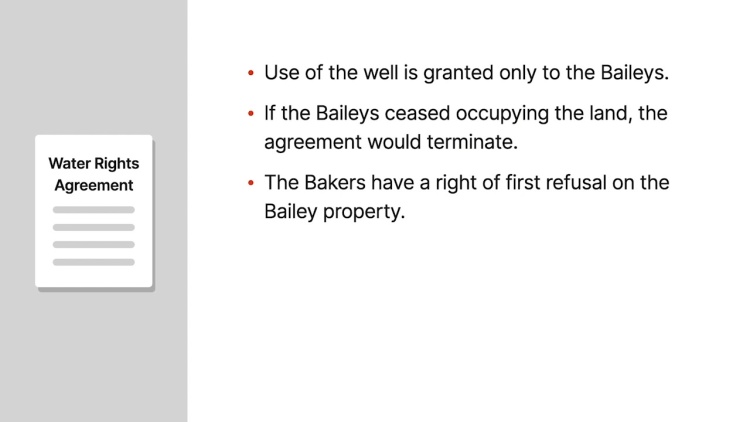Baker v. Bailey
Montana Supreme Court
782 P.2d 1286 (1989)

- Written by Sara Rhee, JD
Facts
Beginning June 1976, Arthur and Elma Bailey (defendants) lived in a mobile home on their daughter’s property and drew water from the same pipeline that serviced their daughter’s home. In 1982, the Baileys’ daughter sold her residence to Grant and Norma Baker (plaintiffs), but reserved one acre of land surrounding the mobile home for the Baileys. The Bakers and the Baileys entered into a Water Well Use Agreement (agreement) to ensure the Baileys had access to water. The agreement was made solely for the Baileys’ benefit and was to terminate once the Baileys ceased to occupy the land. This was done because the Bakers wanted some control over future occupants of the Baileys’ land. The agreement did not reflect this reasoning. However, the Baileys understood that the Bakers would supply water to successive owners if the Bakers deemed them acceptable. The agreement also gave the Bakers the right of first refusal. In 1984 the Baileys sought to sell their property. The Bakers informed the Baileys that they would not be transferring water rights to any subsequent owners. The Baileys were therefore forced to sell their property for $8,000.00, although the land with water would have been worth about $47,500.00. The Bakers then exercised their right of first refusal and purchased the property from the Baileys for $8,000.00. The Bakers subsequently brought suit against the Baileys for unpaid expenses. The Baileys countersued for breach of the agreement. The District Court of the Fourth Judicial District in Minnesota County found the Bakers breached the implied covenant of good faith and fair dealing. The Bakers appealed.
Rule of Law
Issue
Holding and Reasoning (McDonough, J.)
What to do next…
Here's why 908,000 law students have relied on our case briefs:
- Written by law professors and practitioners, not other law students. 47,100 briefs, keyed to 996 casebooks. Top-notch customer support.
- The right amount of information, includes the facts, issues, rule of law, holding and reasoning, and any concurrences and dissents.
- Access in your classes, works on your mobile and tablet. Massive library of related video lessons and high quality multiple-choice questions.
- Easy to use, uniform format for every case brief. Written in plain English, not in legalese. Our briefs summarize and simplify; they don’t just repeat the court’s language.





